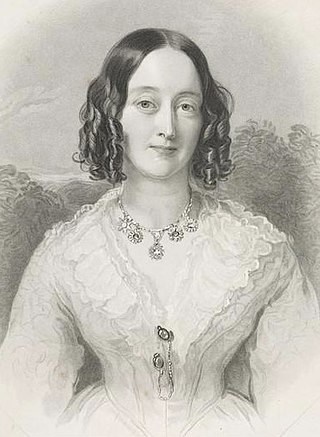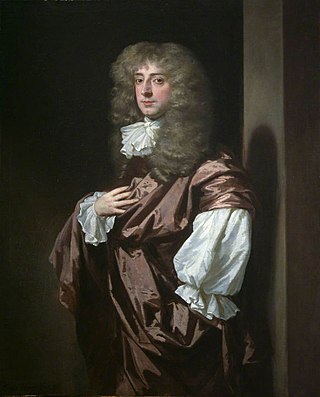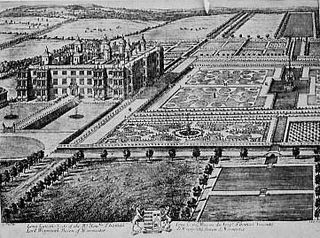
The Royal School for Daughters of Officers of the Army was a girls' boarding school situated in Bath, England. In 1998 it was incorporated into the Royal High School. [1]

The Royal School for Daughters of Officers of the Army was a girls' boarding school situated in Bath, England. In 1998 it was incorporated into the Royal High School. [1]
The Royal School for Daughters of Officers of the Army grew out of the Officers' Widows and Orphans Fund, initiated by philanthropist Alfred Douglas Hamilton [2] as a result of the Crimean War. The school was founded in 1864, and opened on 24 August 1865 under Lady Superintendent Emmeline Maria Kingdon, who was recommended by Florence Nightingale. She retired in 1882. [2] Funding came in part from Queen Victoria, who was a patron. [3] The school's mission was to provide practical and religious education for the daughters of army officers who might otherwise be unable to afford it. The Royal Patriotic Fund was already providing for needy families of soldiers and non-commissioned officers. The Royal Naval Female School, founded in 1840, provided assistance for the daughters of naval officers. It formed the model on which the new school was based. [2]
The Royal School was privately funded, relying on a mixture of subscriptions, legacies and other gifts, and fees. Subscribers were eligible to vote on which girls would receive admission at reduced fees (initially twelve pounds). Larger contributors received more votes.

The school's building was originally intended to be a boys' day school. This school failed and the building, in Lansdown on the outskirts of Bath, was purchased in September 1863. A London office was maintained, initially on Cockspur Street, until a bursar was appointed at Bath after World War II.
In 1870 a junior school was opened in Clarence House at Roehampton, for girls aged ten to fourteen. However, this branch of the school struggled to achieve the standards of the parent institution. In 1885 the junior school closed and the girls transferred to Bath. [4]
In September 1939, after war was declared, the school moved to Longleat and the Admiralty's Hydrographic Department took over the Lansdown premises. [5] Significant improvisation and some construction were required to make the situation workable at Longleat. Lack of space, and difficulty in retaining domestic and teaching staff, were among many problems. However, the school remained there until the end of summer term in 1947. During this time the system of voting for foundationers was suspended, never to be reinstated. This period also saw the deaths of their host Lord Bath, a president The Duke of Connaught, and two chairmen. [4]
The basic admission requirements at the outset were reflected in the school's name. A motion to include the word "necessitous" was defeated, but the school's aims were nevertheless charitable. Daughters of needy officers were admitted at fees of £12 per annum, significantly below cost. Other families paid more. In about 1889, for financial reasons, the committee decided to admit granddaughters of officers and, with the highest fees, daughters of civilian gentlemen. Most fathers were commissioned officers, but a few had risen from the ranks.
The normal age for admission was ten to fifteen. Girls were expected on admission to be able to read and write, and be in good health. Parents were encouraged to send their girls young. It was considered difficult to help them, if they had received only a haphazard education, as they grew older. Pupils were required to leave at the age of eighteen, except under special circumstances. The leaving age was relaxed as academic achievement and admission to university became more important, but the rule was not formally abolished until 1949.
The school was initially only open to Protestant families. This restriction prevented the school from obtaining a grant from the Royal Patriotic Fund to assist with its foundation, but was not lifted until 1920.
A significant number of places were taken by girls who had lost their fathers. In 1901, during the Boer War, 54 out of 120 pupils were fatherless. During the early decades of the school, girls came from all over the British Empire. A particularly large group was those born in India, whether to officers of the Indian Army or British Army units stationed there. When the Indian Army was disbanded in 1947, the school lost an important source of financial support.
After the return from Longleat, the school agreed in principle to accept some pupils sponsored by local education authorities but very few came. In 1949, a few day girls were admitted for the first time. A ratio of 20 day girls to 250 boarders was thought appropriate to maintain the character of the school. [4]
A number of former pupils became notable in later life:

Charlotte Anne Montagu Douglas Scott, Duchess of Buccleuch and Queensberry, VA was a British peeress. A daughter of Thomas Thynne, 2nd Marquess of Bath, Charlotte married Walter Montagu Douglas Scott, 5th Duke of Buccleuch in 1829. They had seven children, including William Montagu Douglas Scott, 6th Duke of Buccleuch; Henry Douglas-Scott-Montagu, 1st Baron Montagu of Beaulieu; and the Royal Navy admiral Lord Charles Montagu Douglas Scott.

Henry Frederick Thynne, 3rd Marquess of Bath, styled Lord Henry Thynne until January 1837 and Viscount Weymouth between January and March 1837, was a British naval commander and politician.

Lord Henry Frederick Thynne PC DL was a British Conservative politician. He served under Benjamin Disraeli as Treasurer of the Household between 1875 and 1880.
Etone College is a secondary academy school in Nuneaton, Warwickshire, England. It was founded in 1910 as the Nuneaton High School for Girls, and is now a mixed school.
Scaitcliffe was a prep school for boys aged 6–13 in Egham, Surrey. Founded in 1896, it was both a boarding and day school. After merging with Virginia Water Prep School in 1996, the school is now co-educational and known as Bishopsgate School. The school is located in a small village near Egham called Englefield Green.

Thomas Thynne, 1st Viscount Weymouth was an English politician who served as president of the Board of Trade from 1702 to 1705.

Bridgerule is a village and civil parish in Devon, England, a mile from the border with Cornwall. The parish is divided by the River Tamar, which no longer forms the border between Devon and Cornwall there. The river often floods the High Street. An electoral ward exists in the area titled Tamarside. The population at the 2011 census was 1,734

Thomas Thynne was an English landowner of the family that is now headed by the Marquess of Bath and politician who sat in the House of Commons from 1670 to 1682. He went by the nickname "Tom of Ten Thousand" due to his great wealth. He was a friend of the Duke of Monmouth, a relationship referred to in John Dryden's satirical work Absalom and Achitophel where Thynne is described as "Issachar, his wealthy western friend".

Thomas Thynne, 2nd Viscount Weymouth of Longleat House in Wiltshire was an English peer, descended from Sir John Thynne (c.1515-1580) builder of Longleat.
Sir James Thynne was an English landowner and politician who sat in the House of Commons in two periods between 1640 and 1670.

Sir Thomas Thynne (c.1578–1639), of Longleat, Wiltshire, was an English landowner and politician who sat in the House of Commons at various times between 1601 and 1629. His romance with the daughter of his family's enemies may have inspired Shakespeare to pen Romeo and Juliet.
Sir Thomas Thynne was an English lawyer and politician who sat in the House of Commons in 1660.
Charles Thynne was an English politician who sat in the House of Commons at various times between 1614 and 1629.
Eastman's Royal Naval Academy, originally in Southsea and later at Winchester, both in England, was a preparatory school. Between 1855 and 1923 it was known primarily as a school that prepared boys for entry to the Royal Navy. Thereafter, it was renamed Eastman's Preparatory School and continued until the 1940s. According to Jonathan Betts, it was "considered one of the top schools for boys intended for the Navy".
Emmeline Maria Kingdon was an English headmistress of the Royal School for Daughters of Officers of the Army in Bath.

Dame Emmeline Mary Tanner, DBE was a British headmistress and educational reformer. She led several schools including Roedean. She was appointed a dame for her contribution to the Education Act 1944.
Ethel Sykes or Ethel Rosalie Sykes was a British teacher and writer. She managed the thousands of women who worked at Lloyds Bank during the first world war. She was retained when many of them were laid off as the soldiers returned.
Katharine Mary Westaway was a British classical scholar and headmistress.
Maria, Lady Thynne born Maria Tuchet nicknamed "Mall" was an English gentlewoman whose marriage was against her and her husband's family's wishes and this led to a long legal dispute. It is possible that this story influenced Shakespeare to start to rewrite the Italian story of Romeo and Juliet. Maria and her mother-in-law's correspondence is extant and gives an insight into their disagreement.